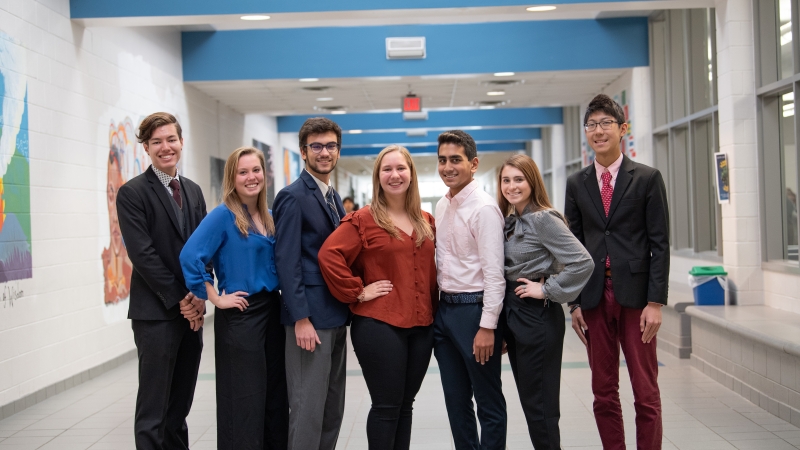
Age of Majority
Under most circumstances, when a student reaches the age of majority on his or her eighteenth (18) birthday, the rights related to special education provided by the school system transfer from the parents or guardians to the student.
In the Commonwealth of Virginia, a student reaches the age of majority on his or her eighteenth (18) birthday and is
- considered to be an adult in the eyes of the law
- legally able to vote
- able to enter into binding contracts
Under most circumstances, when a person reaches the age of majority, the rights related to special education provided by the school system transfer from the parents or guardians to the student.
Transfer of Rights
At least one year prior to a student's 18th birthday, Fairfax County Public Schools (FCPS) is required by law to notify the student and the student's parents or guardians that this transfer of rights will take place. On a student's 18th birthday, the student is legally considered an adult and is then responsible for making decisions concerning his or her educational program. A student may continue to rely on parents or guardians for guidance. Teachers and school administrators are also available to provide advice and support.
Changes That Occur When a Student Reaches the Age of Majority
- All required notices must be provided to both the student and the student's parent or guardian
- All rights afforded to the parents or guardians transfer to the student and FCPS must notify both parties of the transfer of rights
- The student has the right to participate in making decisions about his or her individualized education program (IEP)
- The student has the right to sign his or her IEP
- The student has the primary role of self-advocacy and responsibility for making good educational choices
The Individualized Education Program (IEP) and the Age of Majority
The Individuals with Disabilities Education Act (IDEA) requires that students who receive special education services in the public school setting have an IEP. This document is written specifically to address a student's educational needs.
The IEP is a legal document which outlines the services a student is entitled to as a student with a disability. The IEP describes the student's present level of educational performance, includes individualized goals and objectives, provides information about a student's participation in state and FCPS assessments and describes other information about a student's educational program. The IEP is the document designed to ensure communication among parents, teachers, other school professionals, and the student.
The Student's Role During the IEP Team Meeting
During the IEP team meeting, the student and the members of the IEP team should consider the following:
- the student's strengths and interests
- areas needing improvement and ways to address them
- learning styles and preferences (how does the student learn best?)
- participation in general education and extra-curricular activities
- accommodations required for assignments and tests
- academic goals, career goals, and post-graduation plans
It is important that the student serves as an active participant in the IEP team meeting. The student plays an important role in making well-informed decisions concerning his or her educational program. This can be achieved if the student does the following:
- makes sure that the team members understand the student's personal goals
- takes into account the student's strengths and weaknesses
- discusses plans for future learning experiences
- identifies specific strategies that are helpful as the student attempts to achieve the identified goals
- expresses the student's career interests openly and discusses how to achieve them
- keeps in mind that teachers and administrators will continue to assist the student
Are You Ready?
If additional information concerning age of majority is required, please contact Due Process and Eligibility by telephone at 571-423-4470 or by fax at 571-423-4037.
If parents or guardians are concerned about the need to continue to make educational decisions for their child, refer to the Educational Representation for Adult Students webpage.
For questions or additional resources, contact:
- Your school’s Employment & Transition Representative (ETR)
- Your school’s special education department chair
- Career and Transition Services, 571-423-4150
- Due Process and Eligibility, 571-423-4470
- Correspondence may be addressed to the above offices at:
8270 Willow Oaks Corporate Drive
Fairfax, Virginia 22031
Related Documents
Age of Majority Handout
Under most circumstances, when a student reaches the age of majority on his or her eighteenth (18) birthday, the rights related to special education provided by the school system transfer from the parents or guardians to the student. This is a PDF version of the Age of Majority webpage.
Translations:
SS/SE 338: Certification of the Inability of a Student to Provide Informed Consent for Education Decisions Made Under the Individuals with Disabilities Education Act (IDEA)
Used by FCPS students to certify their inability to make educational decision under IDEA.
SS/SE 340: Specific Power of Attorney for Educational Decisions Made Under the Individuals with Disabilities Education Act (IDEA)
Used to obtain a specific power of attorney to make educational decisions under IDEA.
Related Pages

Forms Related to Special Education
Forms related to the eligibility process, the reevaluation process, and the Individualized Education Program (IEP). Additional forms related to the special education process are also included here.

Educational Representation for Adult Students
Information for parents and guardians who, due to the nature or severity of their student’s disability, desire to continue to serve as their students’ educational representative.

The Special Education Process
Learn how the special education process works and view our Special Education Handbook for Parents.